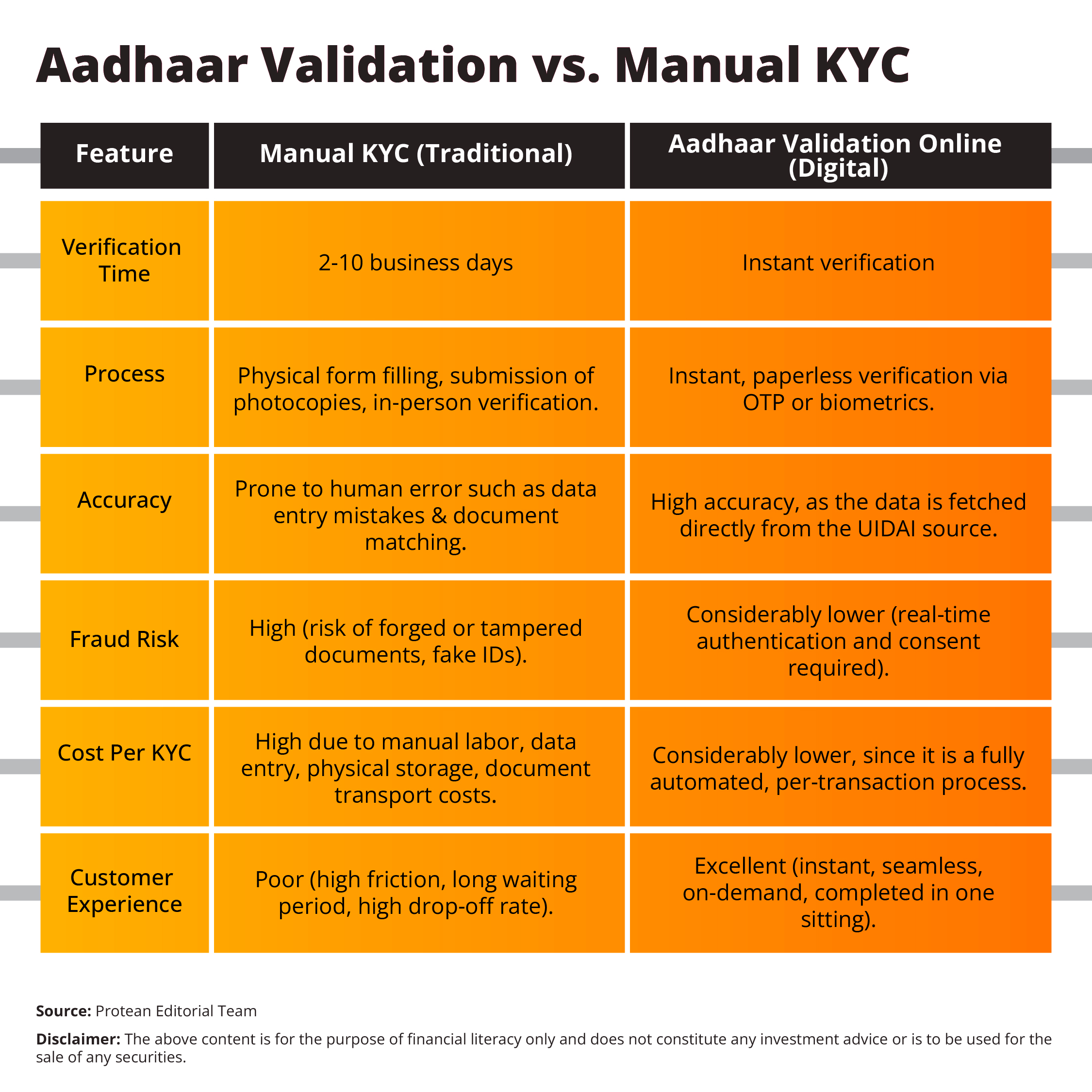Are you planning to choose an Aadhaar validation check for your customers? For any business, Aadhaar validation online can be a strategic move that can effectively optimise customer experience. Businesses can avoid the inconveniences related to lengthy paper-based verification processes, customer drop-offs and significant operational drain by adopting Aadhaar validation.
Let us learn more about Aadhaar validation online system in detail.
The Shift - Aadhaar Validation vs. Manual KYC
Businesses can instantly verify a customer’s identity and address using Aadhaar validation. This verification is led by cross-referencing of details with the UIDAI (Unique Identification Authority of India) database. This method, different from the earlier manual KYC approach, can be more authentic and less time-consuming.
In the traditional manual KYC, you need to follow certain steps.
- Collect physical photocopies of various documents, such as a PAN card for identity, a utility bill or bank statement for address.
- Manually review the physical documents and check for forgeries
- Enter the data into a system
- Store the physical copies securely.
It was not just slow, but expensive, prone to human error, and highly vulnerable to fraud through sophisticated forged documents.
With an Aadhaar validation online method, businesses can replace this entire inefficient chain. The method follows a secure and instantaneous mechanism. The most common method is OTP (One-Time Password) based. Here, the customer has to enter their 12-digit Aadhaar number, and a secure OTP is sent to their registered mobile number. After the customer enters this OTP, they are giving explicit, one-time consent for the verification. The system would then instantly fetch and verify the data.

| Also Read: How Aadhaar Verification Online Works |
The Overwhelming Business Benefits of Instant Aadhaar Validation
Businesses can benefit tangibly and measurably by using the Aadhaar validation system.
A dramatic reduction in operational costs
The cost of a single digital Aadhaar validation check is just a fraction of the end-to-end cost of one manual KYC.
A marked improvement in customer experience
In a competitive market, the business that onboards a customer the fastest often wins. The Aadhaar validation online process can eliminate the primary reason for customer drop-offs during sign-ups. This seamless, frictionless experience can build customer loyalty from the very first interaction and significantly boost conversion rates.
Benefit of unmatched fraud prevention and security
The Aadhaar validation system can verify data directly from the official government source. While highly secure, the system depends on biometric and OTP verification which are resistant to forgery but require proper usage and preventive measures. Thus, your business can reduce the risk of financial losses, chargebacks, and regulatory penalties.
High compliance potential
For regulated industries like banking, finance, and telecom, maintaining a flawless, auditable KYC trail is essential. When properly implemented, businesses can rely on clean, time-stamped, and tamper-proof digital records of every Aadhaar verification. This can simplify and improve the success of regulatory audits.
Where Aadhaar Validation Creates Immediate ROI
The ROI from implementing Aadhaar validation is an immediate financial and operational advantage across specific sectors.
Banking and Fintech
Banks, digital wallets, and lending apps use this method for instant, zero-contact account opening. They approve and disburse personal loans in minutes, not weeks, giving them a massive competitive edge.
Telecom Industry
When obtaining a new SIM card, Aadhaar-based biometric verification is mandatory for activation, enabling faster processing and reducing fraud risks for telecom providers.
The Gig Economy
Platforms that manage ride-sharing, food delivery, or home services verify thousands of drivers and partners. With Aadhaar validation, they can onboard new partners safely and instantly.
Human Resources
Companies are now using Aadhaar validation checks for employee background verification. They use Aadhaar validation to:
- Confirm the identity and address of new hires
- Speed up the hiring process
- Reduce the risk of bad hires
Conclusion
Businesses can implement Aadhaar validation checks as a part of their strategy for business optimisation. Adopting Aadhaar validation online can directly address the three core demands of the modern market:
- Cost efficiency
- A superior customer experience
- Robust security.
Businesses that leverage this powerful tool are building a faster, safer, and more scalable foundation for future growth.
Frequently Asked Questions (FAQs)
Is Aadhaar validation legally mandatory for all businesses?
Aadhaar validation is a regulator-prescribed requirement for specific sectors like banking (for RBI), mutual funds (for SEBI), and telecom (for DoT) to fulfill their KYC obligations. However, it is not a mandatory process requirement for all businesses. Other businesses can use it with explicit customer consent for identity verification purposes.
What is the difference between e-KYC and a simple Aadhaar validation?
A simple Aadhaar validation confirms if the number is active and belongs to the person. Aadhaar e-KYC is a more comprehensive process where, upon user consent (via OTP or biometric), the UIDAI returns a digitally signed, machine-readable file with the resident's name, address, photo, gender, and date of birth to the business.
Can a business directly integrate the Aadhaar validation system?
No, a business cannot connect directly to the UIDAI database. It needs to partner with an authorised Authentication User Agency (AUA) or KYC User Agency (KUA) like Protean eGov Technologies Ltd. These licensed entities provide the secure API, software, and compliance framework to perform verifications legally and securely.

